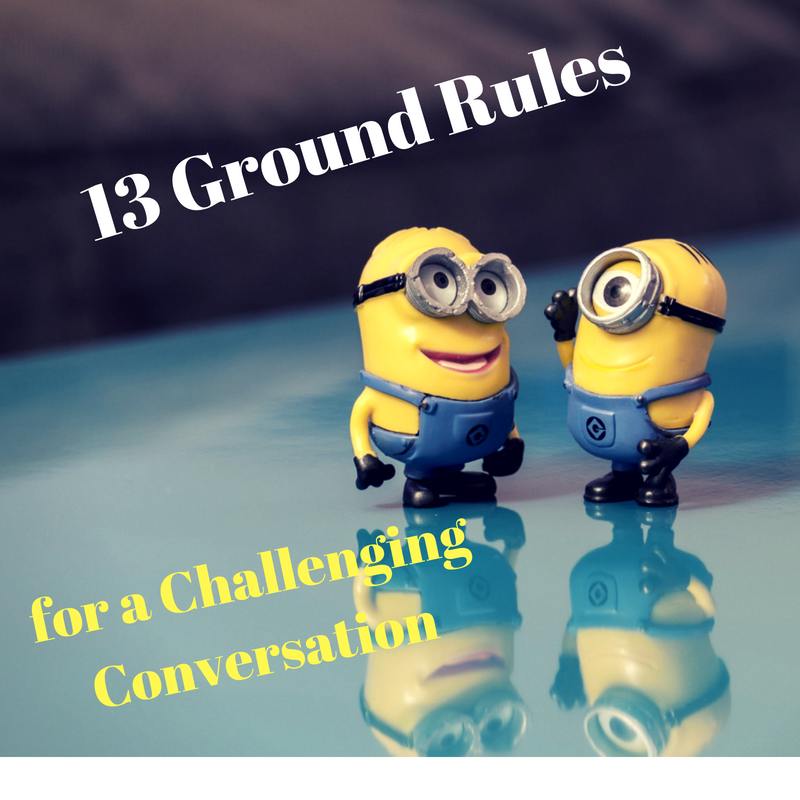 Most everyone dreads the DIFFICULT, CHALLENGING conversation–the one where you have to deliver unpleasant news, discuss a delicate subject, or talk about something that needs to change or has gone wrong.
Most everyone dreads the DIFFICULT, CHALLENGING conversation–the one where you have to deliver unpleasant news, discuss a delicate subject, or talk about something that needs to change or has gone wrong.
Just thinking about having these conversations-whether it’s with your partner, relatives, friends, or co-workers-can fill you with ANXIETY and DREAD. It can take up space in your mind that prevents you from being productive in other areas of your life.
We’re often fearful of the way the other person will react.
It’s normal to want to avoid bad feelings, discomfort and conflict.
The truth is that avoidance in itself can lead to CONFLICT and allow the problem to get worse.
Instead of avoiding difficult conversations, it’s important to find the COURAGE to talk to people in a constructive way, with skill and empathy.
PLANNING and PREPARATION can help turn down the volume of your anxiety and make it much more likely that the difficult conversations you need to have will be successful.
As the saying goes, “Failing to prepare is preparing to fail.”
It’s best to plan a meeting time in advance.
- “I’d like to talk with you about…”
- Mutually agree on a time and a place for the conversation.
It’s never helpful to collect and hold onto feelings of frustration, anger or resentment for days, weeks, or longer, and then dump them on another person all at once.
Whenever possible, try to discuss challenging issues as they come up or SOON thereafter. (I can think of times when the only reason I finally talked is because I let it build up so long that I couldn’t hold it in any longer and it exploded out of me—not the best way to handle it!)
Being PROACTIVE works best.
Ground Rules
- Everyone involved should be sitting or standing so you’re at the same eye level.
- Speak CALMLY. If you are overly emotional with anger and resentment in your voice, they won’t hear your message because your emotions will be the focus.
- Avoid finger-pointing. When you are blaming the other person, they feel like they are being lectured or put down which blocks communication.
- Avoid name-calling, yelling, screaming, cursing, put-downs, insults, or threats. When any of these happen, the only thing other people hear is ANGER and ATTACK. As a result, they are likely to leave, shut down, or attack back. If you want your message to be heard, you have to deliver it RESPECTFULLY.
- Be very clear and specific in describing the things you’d like to have happen or the things you’d like to change.
- Avoid the words “always,” “never,” “everything,” and “nothing.” They may express your frustration and upset, but NO ONE likes to be told that they never do such and such or that they always do such and such.
- No interrupting. When the other person is speaking, LISTEN with the intent of understanding what they are saying.
If you’re thinking about what you’re going to say in response, while he or she is still speaking, you’re NOT listening.
- Approach the conversation with curiosity rather than judgment.Make sure you understand what the other person has said before you respond. If you’re not sure what he or she said or meant, ask for clarification. “Is this what you’re saying?” “Is this what you mean?”
(I can’t tell you how many times I’ve been wrong when I’ve asked that question and thought-“good thing I asked instead of assuming.”)
- Make an effort to be more interested in “problem solving” than being right. When we feel we have to be “right” that means we are making the other person “wrong”.. When we come into it with the right and wrong mindset, it makes conflict more likely. It’s not about being right or wrong, it’s about understanding where each person is coming from and how they are seeing the situation.
- Keep to the topic at hand. Bringing up past issues or complaints interferes with healthy communication during the current conversation. Remind each other, “this is what we’re talking about right now” Save those other issues for another time.
(It can be hard enough to deal with one issue so when we start throwing all those past issues into the playing field, we really complicate things)
- Allow for the possibility of time-outs. Time-outs are not just for young children or professional sports teams.If things start to become too heated, it’s important for people to be able to take a time-out.
Time-outs are an opportunity to calm down and regain composure!
- Take responsibility for feeling the way you do, rather than blaming the other person. Use “I” statements – as in, “I feel…” Be clear and specific about what the other person did that contributed to your reaction.
Rather than saying, “You make me so mad,” say “I feel mad when you make fun of me in front of other people.” (focus on the other person’s actual behaviors)
- Drop your assumptions. Just because you have been living or working together for a period of time doesn’t mean you know what the other person is feeling or thinking. What you want, need, or expect from each other changes and may need to be renegotiated from time to time.
_______________________________________________________________________________
Fay Prairie is a Relationship and Mindset coach. She helps set you free from stress, anxiety, worry, negativity, DEPRESSION AND FRUSTRATION so you can start creating a Better You, a Better Life, and Better Relationships.
Check our her counseling/coaching page by clicking here
Fay also provides workshops and trainings. Check out her speaking page by Clicking Here
Contact Fay to set up a FREE 30 minute call to discover how Personalized Coaching can help you begin making positive changes in your life!
E-mail fay@fayprairie.com
Phone: 507-829-0181


